Mary Anne Yarde's Blog: The Coffee Pot Book Club , page 151
February 28, 2019
#BookReview — The Sugar Merchant by James Hutson-Wiley #Medieval #HistoricalFiction
 The Sugar MerchantJames Hutson-Wiley
The Sugar MerchantJames Hutson-Wiley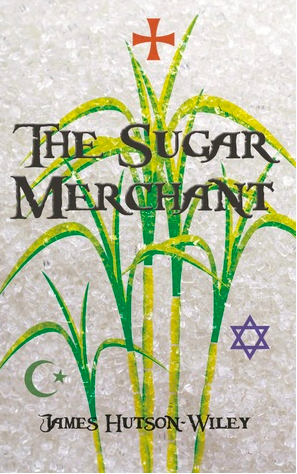
The 11th century world through which the narrator, Thomas Woodward, travels is changing; marked by the emergence of a disruptive commercial revolution. In the Mediterranean, the great Abrahamic faiths of Judaism, Christianity and Islam meet, often in cooperation and peace but, at times, in bloody conflict. It is an era of migration, globalism and multiculturalism leading to a robust interchange of technology, ideas and the basic tools of international trade. But, the interests of the Christian west are on a collision course with those of the Muslim world. War is coming. The Church is rallying the nobles of Europe to embark on an ‘armed pilgrimage’ to reclaim the Holy Land. Now, Thomas and his Muslim and Jewish partners’ lucrative sugar trade is in jeopardy. Thomas’s own secret and dangerous mission, directed from Rome, will become filled with even greater peril.
When Thomas’s family is annihilated in a raid, his life changes forever. Wandering for days, starving and hopeless, he is rescued by a monk and is taken to live at the abbey of Eynsham. There he receives a curious education, training to be a scholar, a merchant and a spy. His mission: to develop commerce in Muslim lands and dispatch vital information to the Holy See.
His perilous adventures during the 11th century’s commercial revolution will take him far from his cloistered life to the great trading cities of Almeria, Amalfi, Alexandria and Cairo.
But the world in which he lives is chaotic. Struggling with love and loss, faith and fortune, can Thomas carry out his secret mission before conflict overtakes him?
Spanning the tumultuous medieval worlds of Judaism, Christianity and Islam, The Sugar Merchant is a tale of clashing cultures, massive economic change and one man’s determination to fulfill his destiny.

“Long ago, I revealed that you will be doing the work of the Lord. On occasion, that work can cause pain and perhaps even death. Be not concerned. You are engaged in matters of importance to God and you are bound by your vow.”
Thomas was only eight years old when his parents were murdered by the traitorous Tostig and his band of Flemish mercenaries. Alone, lost and afraid, Thomas would have surely died if it had not been for Brother Leofric and the monks of Eynsham Abbey.
Eynsham became Thomas’ sanctuary, his home. Here he received an education. However, his schooling was different from the other boys who lived there. Yes, he learnt to read and write along with the rest of them, but he also acquired the skills of a merchant. If that were not enough, Brother Leofric taught him how to defend himself in a fight. Thomas was too respectful to ask why he needed instruction in the latter.
It was only later that he realised the monks had been preparing him for a very different life than the one offered inside the comforting and safe walls of a religious order. Nevertheless, the monks were quick to reassure Thomas that he would still be doing the Lord’s work. With the help of Thomas, Eynsham Abbey will become a centre of learning. However, to do so, they need to acquire the works of the ancients which are currently in the hands of what they called the Infidels. Thomas is entrusted with finding these manuscripts and copying them.
The Abbey’s plan for Thomas would see him travel to the trading cities of Almeria, Amalfi, Alexandria and Cairo. Here, under the disguise of a merchant, would he do the Lord’s work. However, world events threaten everything, including the survival of the manuscripts Thomas is so desperately seeking. It is a race against time. Can Thomas secure what the Abbey needs before the nobles, who are beginning to call themselves the Crusaders, attempt to recapture the Holy Land?
From an unobtrusive village in Essex to the House of Wisdom in the city of Al-Qahirah (Cairo), The Sugar Merchant by James Hutson-Wiley is one of the most compelling Medieval Historical Fiction books that I have ever read.
Spanning two continents, The Sugar Merchant is the extraordinary story of Thomas Woodward — merchant, spy, business partner, and friend. Hutson-Wiley’s compelling narrative and his elegant turn of phrase instantly enthralled me. Told in the first person from Thomas’ perspective, Hutson-Wiley writes with not only tremendous verse but also with an acute sensitivity to historical controversy. The duplicitous way Thomas is mentored by the monks of Eynsham Abbey and manipulated to do their bidding was masterfully illustrated. Thomas is unknowingly held to ransom by the Catholic Church and carries out her orders with this overwhelming sense of gratitude and obligation. However, there are times when Thomas does regret some of the information that he naively passes onto the Church, not realising the significance of it at the time, which suggests that in his subconscious Thomas recognises that he is being used and the Church can be dangerous. There is no doubt in my mind that Hutson-Wiley has a wonderful novelist eye when portraying the human condition. Thomas is almost altruistic whereas the Church, as an institution, is described as manipulative and self-seeking. It made a very interesting comparison.
Although Thomas is the protagonist in this story, there are some magnificent secondary characters in this book, and through them, Hutson-Wiley has explored not only the meaning of friendship but also religion and how it can unite rather than divide. Assad was one of my favourite characters. He is a Muslim who has followed in his father’s footsteps and become a merchant. Assad is an intelligent and a wonderfully enigmatic character who hates camels — all bar one — and exercise! However, he loves elegant clothing and good company. I thought his portrayal was sublime. Hutson-Wiley has created a character who just by being himself is incredibly entertaining. Jusuf, who practices the Jewish faith, is another fabulous character worthy of mention. He has, by contrast, a very calm and collected personality. I thought the relationship between Thomas, Assad and Jusuf was really rather wonderful. They make an unlikely trio, but they all accept each other for who they are and not for their theological beliefs.
The historical detail in this book has to be commended. It is so luxuriant and rich in the telling that I can only imagine how many hours Hutson-Wiley spent researching this era. However, his dedication has certainly paid off, for he has crafted a story that has an incredibly authentic feel. Taking into consideration that The Sugar Merchant encompasses several very different kingdoms, which are unique not only in their history but their geographical landscape and climate, makes this novel a monumental work of impressive scholarship. Add to this the vivacious storytelling, means that whichever way you look at it, this story is a real winner.
What makes The Sugar Merchant so successful when compared to others in its genre is the way Hutson-Wiley has cleverly blended action, religion, espionage, commerce, romance, fear, hate, war, peace, trade and the occasional pirate all within 378 pages, and let’s not forget the meticulously researched historical setting and the colourful cast of unforgettable characters as well! This book has everything a lover of historical fiction could want, and then some.
If you are to read only one book this year, then let it be this one.
I Highly Recommend.
Review by Mary Anne Yarde.
Published on February 28, 2019 22:30
February 27, 2019
Why was Alfred so Great? by Millie Thom #History #AngloSaxon #HistoricalFiction @MillieThom
 Information at the base of Alfred’s statue in Winchester.
Information at the base of Alfred’s statue in Winchester.Alfred’s military accomplishments are the things most people know about. Starting with his defeat of the Danes at Ashdown in 871, while he was still only his brother, King Aethelred’s, second in command, his long struggle against overwhelming numbers of Norse invaders is one that has been loved by story-tellers down the centuries. His desperate withdrawal to the Somerset marshes in 877 continues to enthral and spark the imagination. It was during that time, when he was at his lowest ebb and all seemed lost, that the fictional/mythical tale of him burning the woman’s cakes/loaves of bread supposedly took place.
 The Alfred Jewel, discovered in 1693 in North Pemberton, Somerset. It is owned by the Ashmolean Museum in Oxford. The inscription on the back says ‘Alfred had me made’.
The Alfred Jewel, discovered in 1693 in North Pemberton, Somerset. It is owned by the Ashmolean Museum in Oxford. The inscription on the back says ‘Alfred had me made’. Alfred never looked back or felt at a loss from then on. He went on to raise another army and win a decisive victory at the Battle of Edington in early May 878. Although this was by no means the end of Alfred’s battles with the Danes, it was the start of his great leadership and from then on we see him putting into practice defensive measures across his kingdom and leading with wisdom and forethought.
Alfred’s ‘greatness’, is not due to his political achievements alone. The title is also a tribute to his character and far-reaching views regarding building construction, learning and military and naval advancements.

Image based on information, “The Defence of Wessex” by Hill and Rumble. Author: Hel-hama. Creative Commons.

As an administrator Alfred advocated justice and order and established a code of laws and a reformed coinage. He had a strong belief in the importance of education and learnt Latin in his late thirties. He then arranged, and himself took part in, the translation of books from Latin to Anglo-Saxon.
 Plaque at the base of King Alfred’s statue in Wantage Market Place.
Plaque at the base of King Alfred’s statue in Wantage Market Place.The first tentative step towards the unification of the Anglo-Saxon kingdoms was (arguably) made by Alfred’s father, King Aethelwulf, when he made a treaty with King Beorhtwulf of Mercia. Alfred took things further, firstly by marrying a Mercian woman and later, marrying his eldest daughter, Aethelflaed, to a prominent Mercian ealdorman. In doing this – and the fact that his son-in-law never took the title of King of Mercia – Alfred, and his son after him, could happily take on that role. From then on, unions with the individual kingdoms continued until Alfred’s grandson, Aethelstan, became known as ‘The first king of the ‘English’ or ‘Anglish’– a name derived mostly from the name of the Angles (as in Anglo-Saxons). And England was Angleland.
Many stories about Alfred refer to him as ‘the wise king’, ‘England’s darling’ or ‘Truthteller’. But one chronicler in the Abingdon Chronicle evidently didn’t like Alfred one bit and called him ‘a Judas … piling bad deeds on top of each other.’ The reason he gives is that Alfred ‘violently alienated estates from the monastery’. In the 11thcentury, William of Malmesbury continues this by saying that Alfred ‘took their (i.e. the monasteries’) land and revenues for his own use.
It is true that Alfred became very unpopular with many of the monastic orders. At times during his fight to keep Wessex from the Danes, it had been necessary to ‘pay them off’. In other words he needed huge sums of money to pay the Danes ‘tribute’, or Danegeld, in exchange for them leaving Wessex alone and moving elsewhere to raid – which worked, at least, for a time. To find enough money to do this he was forced to turn to both the Wessex nobility and the Church. I think in this case, perhaps the monks should have been told ‘You can’t have your cake and eat it…’ If Alfred hadn’t taken their money, the Danes would have done! It wouldn’t surprise me to discover that Alfred did, indeed, say something very similar – in his politest Anglo-Saxon, of course.
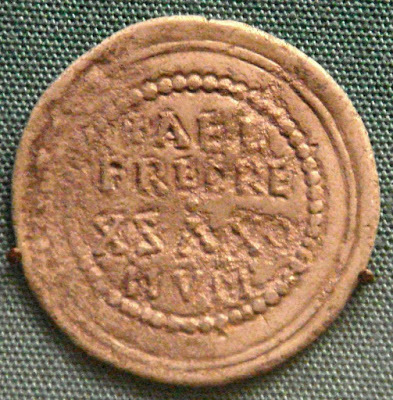 Alfred the Great silver offering penny, 871-899. ‘Aelfred Rex Saxonum’ (Alfred, King of the Saxons).
Alfred the Great silver offering penny, 871-899. ‘Aelfred Rex Saxonum’ (Alfred, King of the Saxons). In my series, Alfred’s story is told alongside that of a second protagonist, Eadwulf, the fictional son of King Beorhtwulf of Mercia. But Eadwulf’s life takes a completely different route, as told in Book One, Shadow of the Raven:
Two kingdoms threatened; two sons of kings learning to survive…
I am currently writing the fourth and final book in the series, ‘King of the Anglo Saxons’ the title applying to Alfred in the later years of his life. This book will bring both Alfred’s and Eadwulf’s stories to a close.
Shadow of the Raven
(Sons of Kings Book 1)

"Historical fiction at its best.'
By the mid ninth century, Danish raids on Anglo-Saxon kingdoms have escalated. Several bands even dare to overwinter on the coastal islands, particularly those at the mouth of the Thames, where the kingdoms of Wessex and Mercia border each other.
The kings of these lands must put past enmity- aside and take the first steps towards unity; steps they see as vital in the face of this newfound threat to their lands . . .
Alfred of Wessex and Eadwulf of Mercia are the sons of kings, whose futures have been determined since birth. But the turbulent events in their childhood years change the natural progression of things – and shape the characters of the men they will become.
Their roads to manhood follow vastly different routes, but both learn crucial lessons along the way: lessons that will serve them well in future years.
Discovering that the enemy is not always a stranger is a harsh lesson indeed; the realisation that a trusted kinsman can turn traitor is the harshest lesson of all.
The story takes us from the kingdoms of Mercia and Wessex to the Norse lands stretching north from Denmark to the Arctic Circle and east to the Baltic Sea. We glimpse the Court of Charles the Bald of West Francia and journey to the holy city of Rome.
And through it all, the two boys move ever closer to their destinies.
Amazon UK • Amazon US
Pit of Vipers
(Sons of Kings Book 2)

In Pit of Vipers, the second book in the Sons of Kings trilogy, the lives of Alfred of Wessex and Eadwulf of Mercia continue to unfold against the ever increasing threat of Danish raids.
Now back in his homeland, Eadwulf sets out on his determined quest for revenge, whilst Alfred’s leadership skills develop at the courts of his successive brothers. Before long, those skills will be put to the test . . .
The Danish invasion of the Anglo-Saxon kingdoms in 865 is merciless and relentless. Every year more Norse ships come to join their comrades in a quest to plunder for wealth and gain domination over the people.
The Wessex king is now Aethelred, Alfred’s last surviving brother, and Alfred becomes his trusted second-in-command. Whilst the Danes take kingdom after kingdom, the brothers wait with baited breath for them to set their sights on Wessex.
By 869 their worst fear is realised.
In the meantime, Eadwulf pursues the objects of his revenge.
Amazon UK • Amazon US
Wyvern of Wessex
(Sons of Kings Book 3)

Eadwulf is back in the Sea Eagle with Bjorn and his crew in a quest to discover if Eadwulf’s father, King Beorhtwulf of Mercia, is still alive after twenty years as a slave. Bjorn’s great dragonship carries them down to the searing June temperatures and strict laws in the Moorish lands of al-Andalus. But searching for Beorhtwulf proves more difficult than they’d expected, causing them more trouble than they bargained for…
In Wessex, King Aethelred is now dead, leaving his twenty-one-year-old-brother, Alfred, to succeed to the throne. Though his succession was agreed by the witan, Alfred must now prove himself worthy of the kingship, or lose it. But Wessex is in turmoil, besieged by Viking Danes intent on subjugating the kingdom – and knowing that the new king is young and inexperienced. Alfred must use all his wiles if he is to outthink and outmanoeuvre Guthrum, the Dane who nearly becomes his nemesis.
Alfred’s victories and defeats take him on a journey of learning, during which he gains experience and strength. We share his highs and his lows and how he rises from the depths of despair to save his beloved kingdom from total conquest.
And at his side at his greatest time of need, is his new ally and friend, Eadwulf of Mercia.
 Millie Thom is a former geography and history teacher with a particular passion for the Anglo-Saxon and Viking period. Originally from Lancashire, she is a mother of six grown up children and now lives with her husband in a small village in Nottinghamshire, midway between the town of Newark and the lovely old city of Lincoln. When not writing, Millie enjoys long walks and is a serious fossil hunter. She is also an avid traveller, swimmer and baker of cakes!
Millie Thom is a former geography and history teacher with a particular passion for the Anglo-Saxon and Viking period. Originally from Lancashire, she is a mother of six grown up children and now lives with her husband in a small village in Nottinghamshire, midway between the town of Newark and the lovely old city of Lincoln. When not writing, Millie enjoys long walks and is a serious fossil hunter. She is also an avid traveller, swimmer and baker of cakes!Connect with Millie: Website • Goodreads • Twitter.
Published on February 27, 2019 23:00
February 26, 2019
Secrets and Spies: Intelligence Gathering During the Napoleonic Wars, by Penny Hampson #History #Napoleonic #Spy @penny_hampson
Secrets and Spies: Intelligence Gathering During the Napoleonic Wars.By Penny Hampson
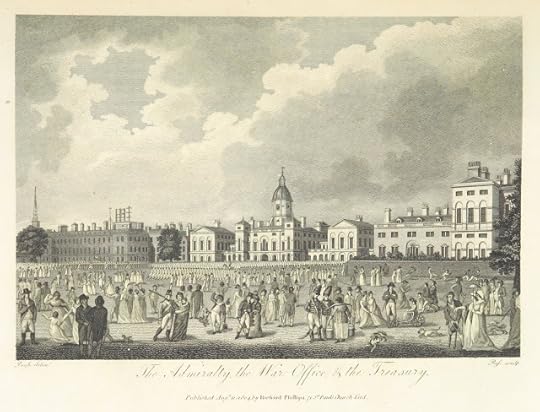
When we talk of espionage today, we think of James Bond action heroes, or perhaps the quiet, outwardly-unremarkable characters of a Le Carré novel. But spying isn’t a new phenomenon - governments have been collecting information and intelligence on their enemies for hundreds of years. There is evidence to suggest that as early as the 1330s, King Edward III of England had a secret intelligence system reporting to him on foreign commerce and shipping. But it was during the Napoleonic Wars that intelligence gathering in Britain developed into something resembling the modern secret service we know today.
In 1797, the Secretary of State for the Home Office, Henry Dundas, who was later created Viscount Melville, commissioned a report to be circulated only to Cabinet members, which amongst other things, stressed the importance and necessity of up-to-date intelligence. Good and reliable information about the enemy was beginning to be regarded as a crucial element in winning the war against Napoleon. Wellington, in particular understood its importance; during the Peninsular Wars he employed code breakers to reveal the secrets of captured French dispatches, helping him to plan his campaigns.
We know government funds were being allocated for the payment of spies from the paperwork left behind. The Civil List for 1786 shows that approximately twenty-five thousand pounds was allocated for foreign secret service operations. Furthermore, the money for intelligence work was not restricted to foreign fields, it was also used at home to deal with perceived threats to the status quo. Payments were made from the fund to subsidise friendly elements of the British press and clergy in return for their help in combatting domestic radical movements, and it was reported that Catholic priests and seminaries received Secret Service Fund monies.
In 1804, a secret treaty with Sweden enabled the establishment of a British military base there, as well as allowing British merchants to operate. The Swedes were initially reluctant to agree to the treaty, fearing reprisals from the French. However, a large payment of sixty thousand pounds persuaded them to change their minds and the treaty was eventually signed. So bribery to attain desired political ends was also considered a valid use of the Secret Service Fund.
Another use for Secret Service funds was the payment of informers. Reports from British diplomats in Europe dwindled with Napoleon’s expanding empire, therefore making recruited paid informants the main source of information in countries under French rule.
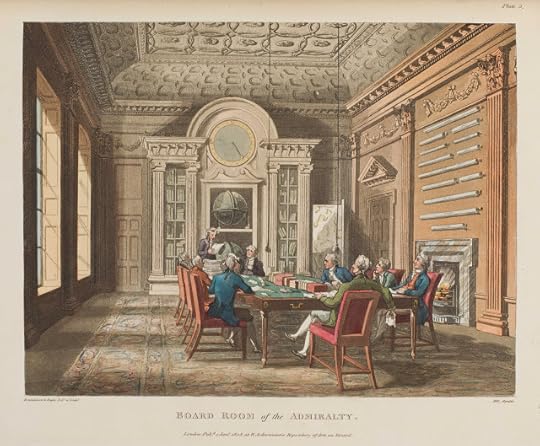
The Royal Navy too, played its part, and received money from the Secret Service Fund. Inactive British naval officers, and even smugglers, were employed as informants; their knowledge of shipping and ports enabled them to send back useful information about French fleet movements. It was suggested, after Nelson’s death, that Lady Hamilton should be paid a pension from the Secret Service Fund, in recompense for her diplomatic and translation services while she was acting as a de facto ambassadress at Naples. This was refused.
You may also be surprised to learn that the British Post Office was a hub of information gathering. Through its staff, local offices, and large fleet of packet ships, it collected, processed, and transmitted intelligence. Around the country and the colonies, postal staff sent in reports on both civil and military matters, reporting on suspicious persons and activities, collecting shipping news and lists of passengers on merchant vessels.

The Post Office Act of 1711 gave the Post Office the legal right to intercept mail. Once opened, letters would be read, analysed and if thought useful, copied, before re-sealing and forwarding to their intended recipients. The copies would be sent to the relevant secretaries of state. In London, foreign correspondence was opened in a special office, known as the ‘Secret Office’. Created in 1653, the Secret Office had a staff of ten by 1801, and cost around five thousand pounds a year to run.
Many intercepted letters were written in code; these were sent to the ‘Decyphering Branch’.
This department, the creation of an Oxford don, the Reverend Edward Willes, was set up in 1703. Some codes were easy to crack, and it was sometimes possible for coded letters to be deciphered and read by the King within a day of them being written. Others proved more difficult and then the race would be on to crack the code and re-seal the letter before its intended recipient grew suspicious about the delay in delivery.
Operatives were employed who were skilled in opening and closing correspondence without leaving any trace; they were able to produce meticulously accurate copies of seals, so that the recipient would never know that they were not the first to read a letter’s contents. Despite the use of seals, ciphers, and invisible ink, a wise man would avoid sending anything by post that he did not want to become public knowledge.
Another major institution involved in intelligence gathering was Lloyd’s. Established in 1688, this association of merchants, bankers, ship owners, and insurance underwriters, whose knowledge of international shipping and naval affairs was unsurpassed, meant that the news of the Battle of Trafalgar was posted at Lloyd’s before the British newspapers got wind of it.

While not an actual government department, Lloyd’s shared with Whitehall important information on naval and military matters. In 1790, Lloyd’s had about thirty-two port correspondents sending back this information. In return for this assistance, the Government reciprocated by occasionally providing protection to merchant ships at risk from privateers, or ordering Royal Navy ships to keep a look out for merchant ships reported missing.
The value of all this information gathering was immense, especially with regard to the formulation of foreign policy and particularly in times of war. The Government often received information that gave useful insights into foreign affairs and clues to impending hostilities.
In my latest novel, An Officer’s Vow, my two main characters unwittingly become involved in espionage when they stumble into… well that would be telling!
SourcesUrban, Mark: The Man Who Broke Napoleon’s Codes, 2001, Faber and FaberMaffeo, Steven E: Most Secret and Confidential: Intelligence in the Age of Nelson, 2000, Chatham Publishing ImagesPost Office - Lewis Walpole LibraryLloyds’ Subscription Room - Lewis Walpole LibraryBoard Room of the Admiralty- Lewis Walpole Library
An Officer’s Vow
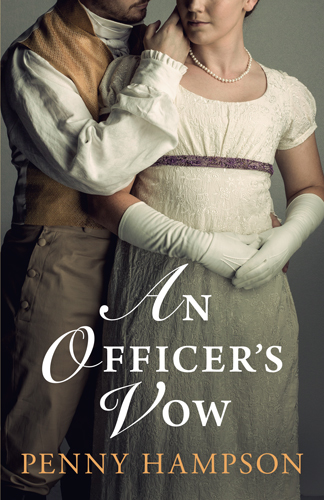
The future looks bleak to Major Nate Crawford. Depressed after being sent home from the Peninsular Campaign as unfit for service, he contemplates ending it all. Then an unexpected opportunity for adventure beckons in the shape of a delightfully intriguing runaway heiress. He will prove his worth as an officer and a gentleman by offering his help. He has a plan…Lottie Benham is desperate. Her life is in danger and she needs a place of safety until her next birthday. The unexpected proposal from this attractive, but intimidating officer could be the answer to her prayers. Not normally a risk-taker, she decides to gamble all by placing her trust in this charismatic gentleman, who she suspects might be more in need of help than she.But the best laid plans… Caught up in conflict, danger, and deception, will Lottie and Nate survive to find the perfect solution to their problems?
Amazon UK • Amazon US
Penny Hampson
 Having worked in various sectors before becoming a full time mum, Penny Hampson decided to follow her passion for history by studying with the Open University. She graduated with honours and went on to complete a post-graduate degree. Penny then landed her dream role, working in an environment where she was surrounded by rare books and historical manuscripts. Flash forward nineteen years, and the opportunity came along to indulge her other main passion – writing historical fiction. Encouraged by friends and family, three years later Penny published her debut novel A Gentleman’s Promise. Penny lives with her family in Oxfordshire, and when she is not writing, she enjoys reading, walking, swimming, and the odd gin and tonic (not all at the same time).Connect with Penny: Website • Twitter
Having worked in various sectors before becoming a full time mum, Penny Hampson decided to follow her passion for history by studying with the Open University. She graduated with honours and went on to complete a post-graduate degree. Penny then landed her dream role, working in an environment where she was surrounded by rare books and historical manuscripts. Flash forward nineteen years, and the opportunity came along to indulge her other main passion – writing historical fiction. Encouraged by friends and family, three years later Penny published her debut novel A Gentleman’s Promise. Penny lives with her family in Oxfordshire, and when she is not writing, she enjoys reading, walking, swimming, and the odd gin and tonic (not all at the same time).Connect with Penny: Website • Twitter
Published on February 26, 2019 23:00
Check out J.P Reedman's fabulous new book — Secret Marriages: Edward IV, Eleanor & Elizabeth #NewRelease #Biography #Medieval @StoneLord1
Secret Marriages: Edward IV, Eleanor & ElizabethBy J.P. Reedman

Eleanor Talbot, newly widowed after the Battle of Blore Heath, meets Edward, Earl of March.
It is a time of trials when the Lancastrians and Yorkists fight for supremacy...and the throne of England.
The Talbots are staunch Lancastrians; Edward is the Son of York.
The Battles of Mortimer's Cross and the bloodbath of Towton lead to Edward taking the crown.
A secret marriage is hatched between the young King and Eleanor, but the “secret queen” is never announced to the Council.
King Edward’s womanising reaches new heights as, within a short time, his eye falls on another widowed beauty, Elizabeth Woodville, whom he also marries in a private, hidden ceremony.
Mortified by all that has happened, Eleanor seeks atonement in religion,...but will her past catch her up?
Will the secret remain secret?
A story of love and lust spanning two families, the Talbots and the Woodvilles, and two women both similar and yet very different. One who became Queen of England, and one who might have been.
Excerpt
The burst of light faded as the figure took a tentative step in her direction and closed the door. Now she saw that the intruder was her chaplain, Father Gray. His face was white, his hands knotted in his cassock. “Lady Eleanor?”
“Father Gray, what is it?” A needle of fear was darting in her breast, making her breaths shallow and ragged. Yet she must not be foolish and allow herself panic. It could be anything. A fire, a flood, a lost child in the village…
“A man has come to the gate…”
“Did you let him in? Who is he?”
“He has ridden from a place called Blore Heath…”
“I do not know it.” Frowning, she shook her head.
Father Gray took a deep breath. “A battle was fought there two days ago, my Lady. The man, a servant of Lord Sudeley, has ridden like the wind. With news.” He stared down at the tiles, hands working nervously.
“What is this news?” Eleanor’s voice emerged a harsh whisper. The blood beat in her head, a steady drum.
“The Earl of Salisbury won a great victory over Lord Audley. Audley is dead. Lord Dudley is captured. Many knights were slain, others gravely injured…”
“And Thomas, what of Thomas. Is he injured?” Eleanor grasped at any hope.
Father Gray’s mouth worked but no words would emerge. He shook his head ever so slightly and crossed himself with a shaking hand.
Eleanor whirled away from the priest, grief and shock overwhelming her. She fell in a faint before the altar, with the bright angels weighing souls upon the Scales of Justice rising above her, the golden beams shooting through their locks colouring the pallor of her stricken face.
Only 0.99 on Kindle for a Limited Time.Free with

Amazon UK • Amazon US
J.P. Reedman
 Born on the West Coast of Canada, J.P. Reedman now lived in the shadow of Stonehenge. A writers since the age of 5, when she wrote her first story about Cleopatra, she now write historical fiction and historical fantasy, with a little bit of general fantasy thrown into the mix. Favourite periods are medieval England, particularly the Wars of the Roses era, and prehistoric Britain. J.P. also writes about figures associated with her hometown of Amesbury, such as Queen Eleanor of Provence and Eleanor of Brittany, both of whom were buried there (and are now lost!) A novella about a third royal lady, Mary Plantagenet, (The Princess Nun) is due out later in the Spring, and looking further ahead, Avous Me Lie, the prequel to the popular I, Richard Plantagenet series which tells the life story of Richard III from his first person perspective.
Born on the West Coast of Canada, J.P. Reedman now lived in the shadow of Stonehenge. A writers since the age of 5, when she wrote her first story about Cleopatra, she now write historical fiction and historical fantasy, with a little bit of general fantasy thrown into the mix. Favourite periods are medieval England, particularly the Wars of the Roses era, and prehistoric Britain. J.P. also writes about figures associated with her hometown of Amesbury, such as Queen Eleanor of Provence and Eleanor of Brittany, both of whom were buried there (and are now lost!) A novella about a third royal lady, Mary Plantagenet, (The Princess Nun) is due out later in the Spring, and looking further ahead, Avous Me Lie, the prequel to the popular I, Richard Plantagenet series which tells the life story of Richard III from his first person perspective.
Published on February 26, 2019 01:04
February 25, 2019
Check out Annie Whitehead's fabulous book — To Be A Queen #Biographical #HistoricalFiction #AngloSaxon @ALWhitehead63
To Be A QueenBy Annie Whitehead
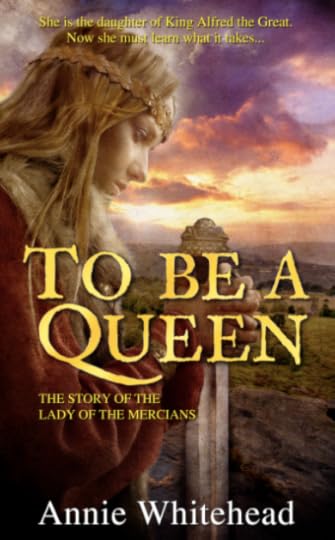
One family, two kingdoms, one common enemy ...
This is the true story of Aethelflaed, the ‘Lady of the Mercians’, daughter of Alfred the Great. She was the only female leader of an Anglo-Saxon kingdom.
Born into the royal house of Wessex at the height of the Viking wars, she is sent to her aunt in Mercia as a foster-child, only to return home when the Vikings overrun Mercia. In Wessex, she witnesses another Viking attack and this compounds her fear of the enemy.
She falls in love with a Mercian lord but is heartbroken to be given as bride to the ruler of Mercia to seal the alliance between the two Anglo-Saxon kingdoms.
She must learn to subjugate her feelings for her first love, overcome her indifference to her husband and win the hearts of the Mercians who despise her as a foreigner and twice make an attempt on her life.
When her husband falls ill and is incapacitated, she has to learn to rule and lead an army in his stead. Eventually she must fight to save her adopted Mercia from the Vikings and, ultimately, her own brother.
To Be A Queen was Long-listed for HNSIndie Book of the Year 2016 and has been awarded an indie BRAG Gold Medallion.
Excerpt
She sat up, pulled on her boots and left the tent. Wulfnoth had disappeared. She was not concerned; he would not have left her unless he knew it was safe to do so. With a growing sense of hope, she walked through a camp which was now near deserted. Dear God, they must have breached the walls, or the gates, or both. Coming to the edge of the encampment she saw the gates of the town hanging open, one almost off its great hinges. Beyond the open gateway, the Danes, surrendered and surrounded, had been herded together.
A Mercian banner fluttered from the watchtower. A thegn on the tower pointed his sword at her and began a victory chant. It was taken up by those below, who all joined in, shouting their triumph in the name of their lady. But Æthelflæd was looking at Frith, who walked towards her with his sword still in his hand, hanging low, dragging. He had blood on his face and his long hair was matted. He had his mail coat on and she gave thanks for his innate tendency to be sensible at such times. But he walked like a wounded man, though she could see that he was whole.
He bowed on one knee before her. “Lady, Derby is yours.”
She put a hand on his shoulder. “Tell me. Who do we mourn?”
His blond brows came together to form a single line above his eyes. Beneath those blue-grey eyes, dark shadows of exhaustion robbed him of his beauty. Careworn, fatigued, speaking carefully through a cut lip, he could give her no more than a list of names.
"Helmstan, Ælfric, Eadwine, Wulfwine.” The rest of her personal guard. “Eadric.”
She opened her mouth but stood, gaping. What did she think to say? No? You are wrong? I misheard you? Of course he was not wrong; he would not break his own heart with lies. He struggled to his feet and she squeezed his arm. Nodding towards the inner courtyard she said, “Do what needs to be done here. I will speak to Elfwen.”
Amazon
Annie Whitehead
 Annie is an author and historian, a member of the Royal Historical Society and of the Historical Writers’ Association. Her first novel, To Be A Queen, chronicles the life of Æthelflæd, Lady of the Mercians, who ruled a country in all but name, and her second, Alvar the Kingmaker, tells the story of Earl Alvar, who served King Edgar and his son Æthelred the Unready who were both embroiled in murderous scandals. Her third novel, Cometh the Hour, charts the life of King Penda. She was a contributor to the anthology 1066 Turned Upside Down. She is the recipient of various awards for her novels and has also won awards for her nonfiction essays. She won the inaugural HWA Dorothy Dunnett Short Story Competition and her first full-length nonfiction book, Mercia: The Rise and Fall of a Kingdom was published by Amberley Books in Sep 2018.
Annie is an author and historian, a member of the Royal Historical Society and of the Historical Writers’ Association. Her first novel, To Be A Queen, chronicles the life of Æthelflæd, Lady of the Mercians, who ruled a country in all but name, and her second, Alvar the Kingmaker, tells the story of Earl Alvar, who served King Edgar and his son Æthelred the Unready who were both embroiled in murderous scandals. Her third novel, Cometh the Hour, charts the life of King Penda. She was a contributor to the anthology 1066 Turned Upside Down. She is the recipient of various awards for her novels and has also won awards for her nonfiction essays. She won the inaugural HWA Dorothy Dunnett Short Story Competition and her first full-length nonfiction book, Mercia: The Rise and Fall of a Kingdom was published by Amberley Books in Sep 2018.Connect with Annie: Website • Blog • Facebook • Twitter.
Published on February 25, 2019 23:00
Call for submissions to new #RichardIII anthology! Whether you write short stories, flash fiction or poetry as long as King Richard III inspires it, Alex Marchant would love to hear from you. @AlexMarchant84
Call for Submissions…
Following the success of Grant Me the Carving of My Name, the first anthology of short fiction inspired by King Richard III sold in support of Scoliosis Association UK (SAUK), I'm pleased to announce plans for a second anthology.
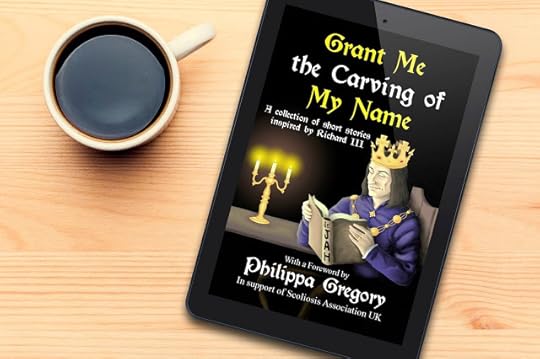
Many people asked to be included in that first anthology after the line-up of stories was finalized, or have since expressed an interest in being included in a second one. Some have offered existing stories or poetry, or plan to write something new specially for a collection.The first anthology comprised contributions mostly from published authors whom I had previously met, either in person or virtually, and whom I knew would have something already written/almost finished. This was vital as time was short when I started planning the anthology and the aim was to publish before Christmas. The full story of how it all came about can be found:HERE!
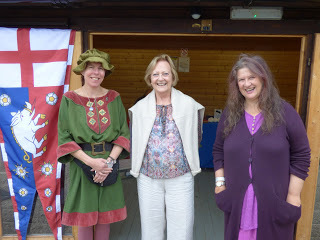 With fellow contributors Marla Skidmore and Janet Reedman at Bosworth re-enactment weekend.
With fellow contributors Marla Skidmore and Janet Reedman at Bosworth re-enactment weekend.This time I would like to cast the net wider and encourage everyone who is interested to submit their work for consideration, not just published authors. Whether you write short stories, flash fiction or poetry inspired by King Richard, I would love to hear from you. Please also encourage any friends or family members to submit.In order to inject a little excitement into the process (!) and optimize the fundraising for SAUK, the call for submissions is being launched as a competition.There are a few very simple rules (see below) and there will be one or two prizes for outstanding entries (most of the contributors to the first anthology have offered signed paperbacks of their books from which one may be chosen or - in the case of Frances Quinn - a painting: full details to come).
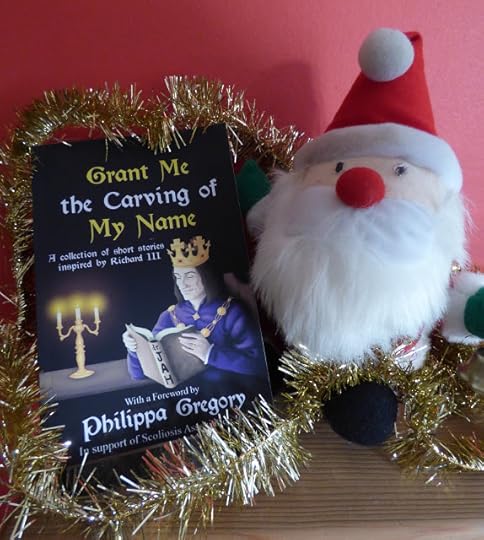
The aim will be to publish the best of the entries in paperback and ebook form on or around 1 November 2019 - in good time for Christmas and all those stockings to be filled. The deadline for entries will be 11.59 p.m. UK time on Sunday 19th May - allowing plenty for time for you to polish up an existing piece of writing (or two or three...), or to compose something completely new. And I hope this also gives plenty of time for you to spread the word to any Ricardians or anyone else you may know who might also wish to enter.For perhaps a little inspiration (if it's needed), a title for the new anthology has already been chosen, namely ' Right Trusty and Well Beloved... ' As many Ricardians will know, this is the opening to many of the king's letters (as it remains for the monarch to this day). To me, the words speak of the loyalty that was such an important part of King Richard's life and of his continuing story over the centuries.I hope that we can use this second anthology as a means to inspire and inform many others about King Richard, his life and times, and about the condition from which he suffered - and also to help raise funds to support people with the condition today.I'm very much looking forward to reading your contributions!Loyaulté me lie

The boring bit...1. Submission is invited of pieces of short fiction (up to about 3,000 words), flash fiction (up to about 200 words) and poetry (up to about 30 lines) (in English only please) inspired by King Richard III. (Lengths are approximate and no minimum length is required. King Richard himself does not have to appear in the piece, but some connection is required. Pieces may be previously published or self-published, but you must own copyright and will be responsible for securing any necessary permissions if selected. Not-yet-published authors are positively encouraged to submit!)2. Please submit your entries to AlexMarchant84@gmail.com. Please either cut and paste the piece in the actual email, or attach as a Word document (ideally in 12 pt Times, double line spaced with indented paragraphs).3. A donation to SAUK of minimum £2.50 is requested on submission (approx. US$3.50 / 3.00 euros). Details of how to donate will be included in a confirmation email. (Please be patient - I will confirm receipt as soon as possible, but it may take some time...)4. Deadline for entries is 11.59 p.m. UK time on Sunday 19th May 2019.5. The editor(s) will endeavour to make the selection of pieces to be included in the anthology, and notify the authors of the chosen entries, by the end of June.*6. Editing of the anthology will take place in July and August. This will entail normal copyediting, and also may include suggestions from the editor(s) for changes to be made. Prompt responses would be appreciated. Authors will be asked to submit a brief biography and details of any publications, social media, etc. for inclusion in the anthology. (See previous anthology for likely format.) All submissions must be finalized by 31st August for inclusion in the anthology. No changes will be allowed after that date (except for essential amendments during the proofreading stage during September-October.)7. All authors will retain copyright of their contributions.8. Publication will be on or around 1st November 2019.9. All proceeds from sales of the anthology will be donated to SAUK. Author paperback copies will be made available to contributors (via Amazon KDP) at cost price (including postage) on the understanding that profits from any sales will be donated to SAUK. (Personal copies/gifts are of course outside this stipulation, although donations are of course always welcome!)10. All contributors will be asked to help promote the anthology on social media or elsewhere. Invitations will be issued to take part in any online or 'bricks and mortar' launch that may be planned.Please contact me at AlexMarchant84@gmail.com with any queries you may have.*If there are insufficient entries of appropriate quality, the editor(s) reserve the right not to proceed with ebook/paperback publication. In that unlikely event, authors of selected pieces may be offered publication on this blog and The Order of the White Boar, as well as via Facebook/Twitter instead.
Published on February 25, 2019 05:17
February 24, 2019
A conversation with Historical Romance author, Glynnis Campbell #Giveaway #Medieval #HistoricalRomance @GlynnisCampbell
A conversation with Historical Romance author, Glynnis Campbell.
Hello, beloved readers! I’m Glynnis Campbell, a USA Today bestselling author of 20+ books published in six languages, most of which are swashbuckling action-adventure romances set in Scotland. I’m also a voice in those video games you won’t let your kids play and the wife of a rock star. I do my best writing on cruise ships, on my husband’s tour bus, and in my southern California garden. Above all, I love to play medieval matchmaker, transporting you to a place where the bold heroes have endearing flaws, the women are stronger than they look, and chivalry is alive and well!

It is so lovely to have you back on the blog, Glynnis. What inspired you to write MAIDS WITH BLADES?
My father introduced me to towering castles and trusty swords when I was a little girl, regaling me with stories about King Arthur and his noble knights. I grew up in California, next to Bidwell Park, the woods that substituted for Sherwood Forest in the Errol Flynn version of “Robin Hood.” So it was only natural that I grew to love all things medieval.
But I never thought the princesses doing stitchery in their solars were half as interesting as the knights-errant going on quests around the countryside. Thankfully, I stumbled upon a culture where women were allowed to wield weapons, take charge, and go on adventures of their own—medieval Scotland.

The three sisters in MAIDS WITH BLADES are descended from Vikings and thus have warfare in their blood. Deirdre, Helena, and Miriel, three kick-arse Scots wenches known as The Warrior Maids of Rivenloch, aren’t about to become any man’s chattel, until they meet heroes who are strong enough to tame their fiery spirits and worthy enough to win their wild hearts.
I also turned my local woods in to Sherwood Forest! What were the challenges you faced in researching this period of history?
Most of the “official” history of the Middle Ages was written by men of the church, who preferred to view women as subservient to men. However, if you look at everyday primary source documents—ledgers, contracts, letters—you see this is not quite the case. Women owned businesses, commanded castles, and even went to battle. In order to unearth evidence of this sort, you have to really dig deep.
 Licensed for use — ArmStreet.
Licensed for use — ArmStreet.A second challenge was dressing my characters. There are only a few sketches and descriptions of Scottish medieval clothing, which is pretty basic. Familiar modern kilts, as romantic as they are, did not exist in the Middle Ages, nor were clans identified by a specific tartan. For the most part, plaids of muted colors were worn like belted blankets over a long linen shirt. Women’s kirtles were fairly simple and drab as well. Since my stories take place along the Borders, I do allow for some English influence in fashion and fabrics, so silks and velvets appear now and then.
There are many books about medieval Scotland. Can you tell us three things that set your novels apart?
Many romance novels set in medieval Scotland feature women who find themselves at the whims of men—lasses married against their will or used as pawns in clan alliances or sold into slavery. My heroines are self-reliant, responsible, and headstrong. If they must marry for the sake of the clan, it’s on their own terms, and they’re likely to meet opposition to their will with the point of a blade or at least a very sharp tongue.

I like flawed characters. In MAIDS WITH BLADES, I’ve given the sisters very different personalities. In LADY DANGER, oldest sister Deirdre is proud of her Viking roots and bears the heavy responsibility of caring for her ailing father and the entire clan. In CAPTIVE HEART, hot-tempered Helena is the first to draw steel when under attack, and her impulsive nature often gets her into trouble. In KNIGHT’S PRIZE, sweet, demure Miriel harbors a secret, one which only her mysterious servant from the Orient knows.
Despite my stories being set in the Dark Ages, I can’t resist lightening things with a large measure of humor. Some readers say that’s their favorite thing about my books. Whether it comes from a humbling situation, a stubborn trait, or a witty remark, there are a lot of laugh-out-loud moments woven into my stories.
What are you currently working on?
I’m writing a sequel series to MAIDS WITH BLADES! The Warrior Daughters of Rivenloch will feature the three oldest cousins of the original heroines from The Warrior Maids of Rivenloch. Book 1, BRIDE OF FIRE, will come out on April 2nd. Books 2 and 3, BRIDE OF ICE and BRIDE OF MIST, will follow later in the year. If you’d like to read the cousins’ very first wee adventure together (they’re just seven years old), check out my short connecting story, A RIVENLOCH CHRISTMAS!

Maids with Blades

The Warrior Maids of Rivenloch boxed set.
Damsels in shining armor...riding to the rescue! Deirdre, Helena, and Miriel, three kick-arse Scots wenches known as The Warrior Maids of Rivenloch, aren’t about to become any man’s chattel, until they meet heroes who are strong enough to tame their wild ways and worthy enough to win their wayward hearts.
Book 1: Lady Danger

A beautiful female warrior has never had trouble turning away men, but when she marries a powerful lord to save her sister, she soon finds herself losing the battle over her heart.
Born to the blade and raised to fear no one, Deirdre of Rivenloch never shies away from a fight and never turns her back on a threat to her land or her family.
But she’s never met a man like Sir Pagan Cameliard, the bold and powerful knight who comes at the king’s command to make a marriage alliance with Rivenloch. To save her younger sister, Deirdre tricks Pagan into marrying her instead, and now she faces a new kind of enemy who crosses swords with her by day and lays siege to her heart by night.
Book 2: Captive Heart
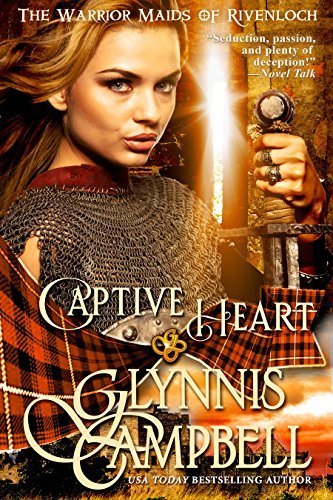
A fierce warrior maid tries to save her sister from marriage by abducting the groom's right-hand man, a plan that goes awry when her hostage is all-too-willing to succumb to her demands.
Helena of Rivenloch has fire in her heart and battle in her blood, and she’s desperate to save her youngest sister from a fate worse than death...marriage. When Helena attempts and fails to slay the bridegroom, she does the next best thing...abducts his right-hand man, the witty and dashing Sir Colin du Lac, and demands her sister as ransom.
But her plans go awry as her captive—amused and enchanted by her wild spirit—becomes a willing participant in her scheme, and Helena soon finds her own heart held hostage.
Book 3: Knight’s Prize

A lovely lady with a secret proves a welcome but dangerous distraction for a mercenary bent on hunting down the mysterious outlaw known as the Shadow.
Miriel of Rivenloch may not have the killer instincts of her older sisters, but she’s keeping a dangerous secret. She knows more than she’s letting on about the mysterious Shadow, the forest outlaw who robs from the rich and gives to the poor.
And when devil-may-care mercenary Sir Rand la Nuit, hot on the trail of The Shadow, claims to be in love with Miriel, she knows he’s hiding something, too. It’s a battle of wits as they race to uncover each other’s secrets before their make-believe romance takes on a life of its own.
Kindle ♥ iBook ♥ Nook ♥ Kobo ♥ Google ♥ Smashwords
Giveaway
Win one of three autographed copy of The Storming!(ebook version for international winners)

To be in with a chance to win answer this question....
Do you ever listen to historical romance audiobooks? If so, do you prefer male or female readers?
Leave a comment below, and on Friday, I'll choose three winners!
Giveaway Rules
♥ Giveaway ends at 11:59pm GMT on March 1st. You must be 18 or older to enter.
♥ Giveaway is open to Internationally.*International winners will receive ebook version.
♥ Only one entry per household.
♥ All giveaway entrants agree to be honest and not cheat the systems; any suspect of fraud is decided upon by blog/site owner and the sponsor, and entrants may be disqualified at our discretion.
♥ Winner has 48 hours to claim prize or new winner is chosen.
Glynnis Campbell
 Glynnis Campbell is a USA Today bestselling author of swashbuckling "medieval action-adventure romances," mostly set in Scotland, with more than 20 books published in six languages. Glynnis once rocked in an all-girl band called The Pinups on CBS Records, did voiceovers for the MTV animated series, "The Maxx," Diablo and Starcraft videogames, and Star Wars audio adventures, and is married to a rock star. She loves to transport readers to a place where the bold heroes have endearing flaws, the women are stronger than they look, the land is lush and untamed, and chivalry is alive and well!
Glynnis Campbell is a USA Today bestselling author of swashbuckling "medieval action-adventure romances," mostly set in Scotland, with more than 20 books published in six languages. Glynnis once rocked in an all-girl band called The Pinups on CBS Records, did voiceovers for the MTV animated series, "The Maxx," Diablo and Starcraft videogames, and Star Wars audio adventures, and is married to a rock star. She loves to transport readers to a place where the bold heroes have endearing flaws, the women are stronger than they look, the land is lush and untamed, and chivalry is alive and well!Connect with Glynnis: Website ♥ Facebook ♥ Twitter ♥ Instagram ♥ Pinterest ♥ BookBub.
Published on February 24, 2019 23:00
February 22, 2019
#BookReview — The Proposition by Jan Selbourne #HistoricalFiction #WWI @JanSelbourne
 The PropositionBy Jan Selbourne
The PropositionBy Jan Selbourne
They met on the eve of a battle. One enlisted to avoid prison, the other enlisted to avoid the money lenders. On the bloodied fields of France, Harry Connelly collapses beside the corpse of Andrew Conroy. It’s a risk, a hanging offence, it’s his only hope for a future. Harry swaps identity discs.
Now known as Andrew, he is just another face in post war London until a letter arrives with a proposition. Accepting will plunge him into a nightmare of murder, family jealousy and greed.
To survive he must live this lie without a mistake, until he falls in love with Lacey. To keep her he must tell the truth and face the consequences.

“Oh, what a tangled web we weave, when first we practice to deceive!” Marmion: A Tale of Flodden Field , by Sir Walter Scott
It had seemed like a good idea at the time, isn’t that what they all say? It would be an adventure to fight for your country. A chance to see the world. And anyway, it would all be over by Christmas. However, Harry Connelly had not enlisted because he was particularly patriotic, or because he wanted to travel to new places and have an adventure. Oh, no, that was not the reason at all. And yet, here he was in France, waiting for the bullet with his name on it to end his life. He was just another piece of useless fodder for the enemy’s artillery fire.
If, by some miracle, he managed to dodge the bullets, what then? Harry couldn’t go home. He was a wanted man, and besides, he didn’t have a home, not anymore. Harry could see no way out of the situation he found himself in — that was until he met Andrew Conroy on the eve of a battle that would change the course of Harry’s life forever. For Andrew, this bloody battle was to be his last, but for Harry, this was the opportunity he had not known he had been waiting for. All he had to do was swap his identity discs for Andrew’s. If he had the courage, then Harry Connelly could die here, today, on this battlefield, with a thousand other poor souls. If he had the courage, he could start again, with a new name, a new identity, and a new life. If, he had the courage…
However, Andrew had enlisted because of a substantial gambling debt. Those he owed had run out of patience. They wanted their money, and they wanted it now. Also unbeknownst to Harry, Andrew was also the illegitimate son of the successful and influential, Lester Haines. By taking on Andrew’s identity, Harry finds himself drawn into a world of money, greed, and murder. If he is to survive, then he must keep his wits, for Andrew’s family will do anything and everything to keep their secrets from the police and, more importantly, from the papers.
From the horrors of the Western Front to a barrister’s office in Arisaig, Scotland — The Proposition, by Jan Selbourne is a gripping murder mystery thriller with a hint of romance, set in the backdrop of post-war Britain.
Selbourne has crafted a vastly entertaining story that has enough subplots and twists to keep even the most hardened historical murder mystery fan enchanted. The story follows Harry Connelly as he tries desperately to forge a new life with someone else’s identity. It is said that what goes around comes around and therefore it could be said that Harry got what he deserved when he swapped Andrew Conroy’s identity discs with his own. Instead of a chance to start again, Harry is plunged into a world of intrigue and danger. Andrew’s aristocratic family certainly have more than their share of skeletons in their closets, and Harry finds himself drawn into this dysfunctional family who will do absolutely anything to stop the truth from getting out. A scandal would ruin them all.
Despite his lies and subterfuges, Harry is a likeable character. The story of why he took Andrews identity is not explained straight away, so I must admit, I did find his motives a little confusing, and initially, I didn’t take to him because of this. However, when Harry eventually explains why he did what he did, I could appreciate his situation and his reasoning, although I did not agree so much with his methods! Nevertheless, his story is an intriguing one and as he became more entangled with the very troubled Haines family, I found myself sympathising with him.
I adored the characterisation of Lacey Haines. Lacey is from the disowned and impoverished, side of the family. However, out of all the Haines, she is the only one who has a scrap of integrity and decency. Lacey is a strong and courageous woman, who nevertheless comes to breaking point on several occasions, which made her character incredibly believable. I thought her relationship with her late sister’s four-year-old daughter was wonderful to behold. Lacey is the true hero of this story.
As with all good murder mysteries, I found myself trying to figure out who the murderer was, but it turns out my detective skills are not very good. It pains me to admit that who I thought was the murderer, wasn’t!
If you are looking for your next historical murder mystery, then The Proposition is the book for you.
I Highly Recommend.
Review by Mary Anne Yarde.The Coffee Pot Book Club.
Amazon UK • Amazon US
Jan Selbourne
 Jan Selbourne was born and educated in Melbourne, Australia and her love of literature and history began as soon as she learned to read and hold a pen. After graduating from a Melbourne Business College her career began in the dusty world of ledgers and accounting, working in Victoria, Queensland and the United Kingdom. On the point of retiring, she changed course to work as secretary of a large NSW historical society. Now retired Jan is enjoying her love of travelling and literature. She has two children, a stray live in cat and lives near Maitland, New South Wales
Jan Selbourne was born and educated in Melbourne, Australia and her love of literature and history began as soon as she learned to read and hold a pen. After graduating from a Melbourne Business College her career began in the dusty world of ledgers and accounting, working in Victoria, Queensland and the United Kingdom. On the point of retiring, she changed course to work as secretary of a large NSW historical society. Now retired Jan is enjoying her love of travelling and literature. She has two children, a stray live in cat and lives near Maitland, New South WalesConnect with Jan: Website • Facebook • Twitter • Linkedin
Published on February 22, 2019 23:30
#BookReview — The King of Dunkirk: The King’s Germans Book #2, by Dominic Fielder #Military #HistoricalFiction @Kings_Germans
 The King of DunkirkThe King’s Germans Book #2By Dominic Fielder
The King of DunkirkThe King’s Germans Book #2By Dominic Fielder
May 1793: The French border.
Valenciennes, Paris then home! Every common soldier knows the popular refrain so why can’t the commanders see sense?
The protracted siege of Valenciennes exposes the mistrust between the allies. National interests triumph over military logic. The King’s Germans find themselves marching north to the coast, not east to Paris. Dunkirk has become a royal prize, an open secret smuggled to the French, who set a trap for the Duke of York’s army.
Lieutenant Erich von Bomm and Captain Werner Brandt find themselves in the thick of the action as the 14th Nationals, the Black Lions, seek their revenge. In the chaos of battle, Sebastian Krombach, working alongside Major Trevethan, the engineer tasked with capturing Dunkirk, must make a dreadful choice: to guide a battalion of Foot Guards to safety across the Great Moor or carry a message that might save the life of a friend.
The King’s Germans and the Black Lions do battle to determine who shall
be crowned the King of Dunkirk.

“Now we have an Admiral with no fleet to keep good company with the artillery officer with no guns.”
Together they may stand but united they are not. As the smoke settled over Valenciennes and voices rang out in praise of the Duke of York, one thing became abundantly clear, this war was nothing more than a complicated game of politics and seemingly selfish national interest. If the Allies cannot overcome their differences and work towards defeating the French then what use was a victory? It made a mockery of the lives sacrificed by the soldiers who had fought for their king and their respective countries.
This war was nothing but a bureaucratic headache, and every soldiers' worst nightmare. How can they fight, how can they win, when desperately needed supplies were so late in coming? For the common soldier, the army was swiftly becoming something that resembled a farce. But who were they to question their superiors?
Major Stephen Trevethan, an engineer adviser to the Duke of York, is in need of maps. Lots of maps. For how can a successful campaign be planned without them? But his plea for a skilled cartographer goes unanswered. It is a dire situation and one that he must resolve, for lives depend upon it.
Sergeant Gauner sees nothing special in Sebastian Krombach, a soldier of the 2nd Battalion of the 10th Hanoverian Regiment — The King’s German League. But by chance, Major Trevethan has seen one of Kronbach’s sketches. Whether Sergeant Gauner likes it or not, Trevethan will borrow Kronbach — the war demands it, and Trevethan commands it.
Kronbach now finds himself under Major Trevethan’s command, but as he plays the game of cat and mouse with the enemy as he maps their defences, he cannot help but wish he was back with his friends in the regiment. If only they knew the danger Kronbach was in everyday, then they would not be so eager to listen to Sergeant Gauner as he criticises his absence.
From the siege of Valenciennes to the Battle on the beaches of Dunkirk, The King of Dunkirk: The King’s Germans Book #2, by Dominic Fielder is the suspenseful military tale about the war between the First Coalition and the French First Republic.
Well, Fielder has done it again. His brilliantly executed narrative complimented by an impressive historical backdrop makes for compulsive reading. This book is full of non-stop military action, as well as very colourful and gripping characterisation. I thought the portrayal of Sebastian Krombach was sublime. Here is a regular soldier whose skill is by chance discovered by Major Treventhan. Krombach’s humility and his respect for the Major make Krombach one of those characters who you really root for. I wanted him to have a good war — if, there is such a thing. Likewise, the Cornish Major Trevethan continued to fascinate.
Like before, with book #1 of the King’s Germans, Fielder shows the war from both sides. I thought the portrayal of Maurice Caillat, a stable boy, turned investigator, was magnificent. At times, he seemed completely out of his depth, but he shows remarkable courage in the face of an impossible situation. His life, like that of Captain Julien Beauvais of the 3rd Dragoons, is not assured.
The attention to historical detail has to be commended. Fielder writes with a great deal of elegance and authority. He skilfully maps the disorganised chaos of the Allies — Admiral Macbride really did arrive without any ships, and the British did not possess the siege artillery that they needed to lay siege. Fielder has captured the utter frustration of the officers who were trying to win this war without the means to do so. In fact, Fielder’s prose is so real in the telling that I fancied I could hear the sound of the cavalry charging into battle, the clash of the bayonets, and, of course, the deafening reverberation of the field artillery and the rifles as they fired upon the enemy. His observation of everyday detail is also worthy of note — the menace of the flies, the terrible heat of the day, the desperate need of the soldiers for new boots… Fielder has a real eye for knowing what makes history worth reading while staying true to the documented history, as well as what captures his readers’ attention.
If you are looking for your next action-packed historical military series, then this is it. The King of Dunkirk: The King’s Germans Book #2 will undoubtedly appeal to anyone who loves Bernard Cornwell’s bestselling Sharp series.
I Highly Recommend.
Review by Mary Anne Yarde.The Coffee Pot Book Club.
Amazon UK • Amazon US
Dominic Fielder
 Dominic Fielder (1968-present) was born in Plymouth to parents of families from Roman Catholic and Protestant backgrounds. Then such things mattered to others but not to a first-born son who knew only love and a stable happy family. Two brothers made for a warm and somewhat idyllic childhood. He was bright but a disengaged student preferring instead to spend time with his dad at the family book business (the Bookstall) where a love of literacy flourished. Having finished sixth-form at Devonport High School for Boys, he passed opportunities to join first, the Tank Regiment, then the Royal Air Force, settling instead on a career in banking. Three years later, fed up with counting other people’s money, he travelled to Australia for a year, working for a time in the Outback and thoroughly enjoying life!
Dominic Fielder (1968-present) was born in Plymouth to parents of families from Roman Catholic and Protestant backgrounds. Then such things mattered to others but not to a first-born son who knew only love and a stable happy family. Two brothers made for a warm and somewhat idyllic childhood. He was bright but a disengaged student preferring instead to spend time with his dad at the family book business (the Bookstall) where a love of literacy flourished. Having finished sixth-form at Devonport High School for Boys, he passed opportunities to join first, the Tank Regiment, then the Royal Air Force, settling instead on a career in banking. Three years later, fed up with counting other people’s money, he travelled to Australia for a year, working for a time in the Outback and thoroughly enjoying life!On returning to the UK, he drifted into work at his family’s Comic Shop (Kathies Comics). Despite fifteen years of hard work, the business failed and so did his marriage. Working a series of odd jobs, with odd hours, he finished a degree course in History, gaining a First and drifted into the world of education. Now he divides his time unequally between private tuition, running the family book business which has survived for sixty years and writing. More important than all of these, is spending time with his son. With what free time he has, he enjoys cycling, walking and horse-riding on the moors that surround his home in Mary Tavy, Devon.
His passion and interest for as many years as he can care to remember has been ‘little model soldiers’, painting them, researching facts about the regiments and playing wargames with them. For a dozen years or more, Dominic ran a series of ‘Megagames’ where people would arrive from all corners of the globe to game out World War Two scenarios for a week. Such events needed a strong narrative and his first attempts at writing were contained within the pre-game intelligence and the post-action reports. His writing project, ‘The King’s Germans’ is a few steps further down that road. For the person who drifted from one task to another, it’s a commitment to write twenty-two years of the history of Hanoverian soldiers in the service of King George III.
Connect with Dominic on: Facebook • Twitter.
Published on February 22, 2019 23:00
Vanda Vadas' fabulous book, The Prodigal Laird, is now available on #NetGalley #HistoricalRomance @Vanda_Vadas
Have you heard…?
VandaVadas' fabulous book, The Prodigal Laird, is available on NetGalley for your reading pleasure. If you love great historical romance then this is the book for you.

The Prodigal LairdBy Vanda Vadas

His marriage might cease decades of hostilities between two clans, but that doesn't mean he wants it-or his bold new wife who is keeping secrets of her own.Roderick MacLeod arrives in his native Scottish Highlands to pay brief respects to his recently deceased father-the man Roderick blames for the death of his English mother. But before he can return to England, he is saddled with two responsibilities he never asked for: the title of Laird of Clan MacLeod and an unwanted marriage, by proxy, to the daughter of a rival laird. Annabel MacDonald thought she had the perfect marriage; her husband's continued absence allowed her independence and the freedom to secretly hide and abet the escape of her fugitive clansmen. When the husband she'd never met shows up, she must convince him to return to England before he uncovers her many secrets, and perhaps her heart.
To grab your copy of The Prodigal LairdClick
HERE!
What is NetGalley?
How It Works (in their own words…)NetGalley connects publishers and authors to an enthusiastic community of early influencers who will help their book succeed: librarians and booksellers who order and recommend books to their patrons, media professionals who interview authors, reviewers and bloggers who write about books online and leave reviews on retail sites, and more. Publishers and authors list their titles on NetGalley for members to request, read, and review, and members gain free access to a vast catalog of digital review copies.
NETGALLEY FOR MEMBERS
NetGalley is a service to help readers of influence discover and recommend new books to their audiences. If you are a reviewer, blogger, librarian, bookseller, educator, journalist or other member of the media, you can use NetGalley for free to request, read, and recommend books before they are published.Your reviews and feedback are essential to publishers and other readers!
Become a NetGalley member today! NetGalley
NetGalley for Authors
Are you an author? Would you like to see your book on NetGalley. The Coffee Pot Book Club offers affordable NetGalley promotion. Click HERE to find out more.
<!-- /* Font Definitions */ @font-face {font-family:"Cambria Math"; panose-1:2 4 5 3 5 4 6 3 2 4; mso-font-charset:0; mso-generic-font-family:roman; mso-font-pitch:variable; mso-font-signature:-536870145 1107305727 0 0 415 0;} @font-face {font-family:Calibri; panose-1:2 15 5 2 2 2 4 3 2 4; mso-font-charset:0; mso-generic-font-family:swiss; mso-font-pitch:variable; mso-font-signature:-536859905 -1073732485 9 0 511 0;} @font-face {font-family:Garamond; panose-1:2 2 4 4 3 3 1 1 8 3; mso-font-charset:0; mso-generic-font-family:roman; mso-font-pitch:variable; mso-font-signature:647 0 0 0 159 0;} /* Style Definitions */ p.MsoNormal, li.MsoNormal, div.MsoNormal {mso-style-unhide:no; mso-style-qformat:yes; mso-style-parent:""; margin:0cm; margin-bottom:.0001pt; mso-pagination:widow-orphan; font-size:12.0pt; font-family:"Calibri",sans-serif; mso-ascii-font-family:Calibri; mso-ascii-theme-font:minor-latin; mso-fareast-font-family:Calibri; mso-fareast-theme-font:minor-latin; mso-hansi-font-family:Calibri; mso-hansi-theme-font:minor-latin; mso-bidi-font-family:"Times New Roman"; mso-bidi-theme-font:minor-bidi;} p {mso-style-noshow:yes; mso-style-priority:99; mso-margin-top-alt:auto; margin-right:0cm; mso-margin-bottom-alt:auto; margin-left:0cm; mso-pagination:widow-orphan; font-size:12.0pt; font-family:"Times New Roman",serif; mso-fareast-font-family:"Times New Roman";} .MsoChpDefault {mso-style-type:export-only; mso-default-props:yes; font-family:"Calibri",sans-serif; mso-ascii-font-family:Calibri; mso-ascii-theme-font:minor-latin; mso-fareast-font-family:Calibri; mso-fareast-theme-font:minor-latin; mso-hansi-font-family:Calibri; mso-hansi-theme-font:minor-latin; mso-bidi-font-family:"Times New Roman"; mso-bidi-theme-font:minor-bidi;} @page WordSection1 {size:612.0pt 792.0pt; margin:72.0pt 72.0pt 72.0pt 72.0pt; mso-header-margin:36.0pt; mso-footer-margin:36.0pt; mso-paper-source:0;} div.WordSection1 {page:WordSection1;} </style> -->
VandaVadas' fabulous book, The Prodigal Laird, is available on NetGalley for your reading pleasure. If you love great historical romance then this is the book for you.

The Prodigal LairdBy Vanda Vadas

His marriage might cease decades of hostilities between two clans, but that doesn't mean he wants it-or his bold new wife who is keeping secrets of her own.Roderick MacLeod arrives in his native Scottish Highlands to pay brief respects to his recently deceased father-the man Roderick blames for the death of his English mother. But before he can return to England, he is saddled with two responsibilities he never asked for: the title of Laird of Clan MacLeod and an unwanted marriage, by proxy, to the daughter of a rival laird. Annabel MacDonald thought she had the perfect marriage; her husband's continued absence allowed her independence and the freedom to secretly hide and abet the escape of her fugitive clansmen. When the husband she'd never met shows up, she must convince him to return to England before he uncovers her many secrets, and perhaps her heart.
To grab your copy of The Prodigal LairdClick
HERE!
What is NetGalley?
How It Works (in their own words…)NetGalley connects publishers and authors to an enthusiastic community of early influencers who will help their book succeed: librarians and booksellers who order and recommend books to their patrons, media professionals who interview authors, reviewers and bloggers who write about books online and leave reviews on retail sites, and more. Publishers and authors list their titles on NetGalley for members to request, read, and review, and members gain free access to a vast catalog of digital review copies.
NETGALLEY FOR MEMBERS
NetGalley is a service to help readers of influence discover and recommend new books to their audiences. If you are a reviewer, blogger, librarian, bookseller, educator, journalist or other member of the media, you can use NetGalley for free to request, read, and recommend books before they are published.Your reviews and feedback are essential to publishers and other readers!
Become a NetGalley member today! NetGalley
NetGalley for Authors
Are you an author? Would you like to see your book on NetGalley. The Coffee Pot Book Club offers affordable NetGalley promotion. Click HERE to find out more.
<!-- /* Font Definitions */ @font-face {font-family:"Cambria Math"; panose-1:2 4 5 3 5 4 6 3 2 4; mso-font-charset:0; mso-generic-font-family:roman; mso-font-pitch:variable; mso-font-signature:-536870145 1107305727 0 0 415 0;} @font-face {font-family:Calibri; panose-1:2 15 5 2 2 2 4 3 2 4; mso-font-charset:0; mso-generic-font-family:swiss; mso-font-pitch:variable; mso-font-signature:-536859905 -1073732485 9 0 511 0;} @font-face {font-family:Garamond; panose-1:2 2 4 4 3 3 1 1 8 3; mso-font-charset:0; mso-generic-font-family:roman; mso-font-pitch:variable; mso-font-signature:647 0 0 0 159 0;} /* Style Definitions */ p.MsoNormal, li.MsoNormal, div.MsoNormal {mso-style-unhide:no; mso-style-qformat:yes; mso-style-parent:""; margin:0cm; margin-bottom:.0001pt; mso-pagination:widow-orphan; font-size:12.0pt; font-family:"Calibri",sans-serif; mso-ascii-font-family:Calibri; mso-ascii-theme-font:minor-latin; mso-fareast-font-family:Calibri; mso-fareast-theme-font:minor-latin; mso-hansi-font-family:Calibri; mso-hansi-theme-font:minor-latin; mso-bidi-font-family:"Times New Roman"; mso-bidi-theme-font:minor-bidi;} p {mso-style-noshow:yes; mso-style-priority:99; mso-margin-top-alt:auto; margin-right:0cm; mso-margin-bottom-alt:auto; margin-left:0cm; mso-pagination:widow-orphan; font-size:12.0pt; font-family:"Times New Roman",serif; mso-fareast-font-family:"Times New Roman";} .MsoChpDefault {mso-style-type:export-only; mso-default-props:yes; font-family:"Calibri",sans-serif; mso-ascii-font-family:Calibri; mso-ascii-theme-font:minor-latin; mso-fareast-font-family:Calibri; mso-fareast-theme-font:minor-latin; mso-hansi-font-family:Calibri; mso-hansi-theme-font:minor-latin; mso-bidi-font-family:"Times New Roman"; mso-bidi-theme-font:minor-bidi;} @page WordSection1 {size:612.0pt 792.0pt; margin:72.0pt 72.0pt 72.0pt 72.0pt; mso-header-margin:36.0pt; mso-footer-margin:36.0pt; mso-paper-source:0;} div.WordSection1 {page:WordSection1;} </style> -->
Published on February 22, 2019 01:11
The Coffee Pot Book Club
The Coffee Pot Book Club (formally Myths, Legends, Books, and Coffee Pots) was founded in 2015. Our goal was to create a platform that would help Historical Fiction, Historical Romance and Historical
The Coffee Pot Book Club (formally Myths, Legends, Books, and Coffee Pots) was founded in 2015. Our goal was to create a platform that would help Historical Fiction, Historical Romance and Historical Fantasy authors promote their books and find that sometimes elusive audience. The Coffee Pot Book Club soon became the place for readers to meet new authors (both traditionally published and independently) and discover their fabulous books.
...more
...more
- Mary Anne Yarde's profile
- 159 followers



